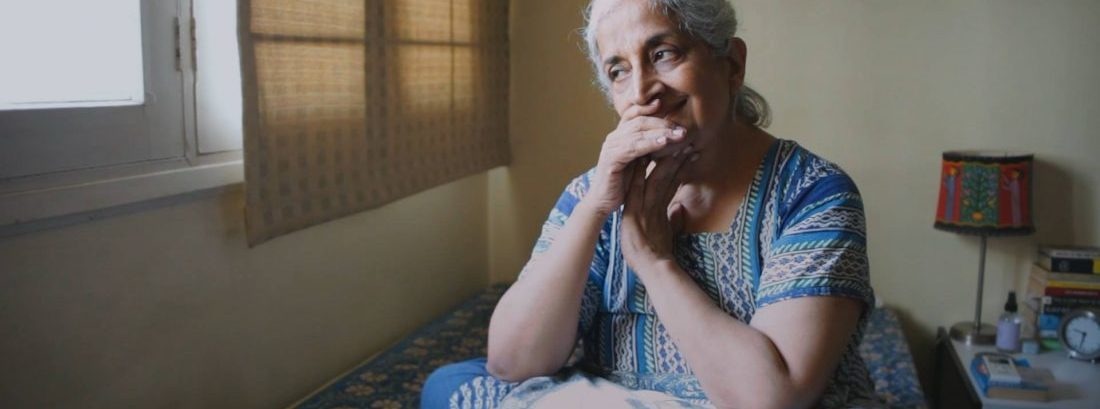After Sabeen is a story about two women who lifted each other up
For the past few months, the Goethe Institut's Sunday Matinees have been drawing large audiences to Capri Cinema via unkempt, dug-up roads, but this Sunday, the audience wept together, and laughed at some points too, wiping away tears as the scene cut to the credits of the first screening of documentary Sabeen Ke Baad or After Sabeen.
Directed by German filmmaker Schokofeh Kamiz, the documentary is perhaps the first time that the lives of people who knew Sabeen Mahmud, the slain activist and the founder of The Second Floor (T2F), have come to life on camera after she was shot dead on April 24, 2015 in Karachi.
I would be lying if I said I walked into the cinema with ease. The sense of loss and grief was very much present despite four years since the incident.
However, what makes the documentary more than just interviews and montages is the weaving of Sabeen’s relationship with those who loved her, especially her mother, Mahenaz Mahmud, who was also present at the screening.
Schokofeh never met Sabeen but was inspired to know about her after a friend talked about Sabeen for seven hours and yet was unable to describe the enigma Sabeen was.
The film opens with an old Sabeen interview in which she speaks about her wish to “burst the bubble of apathy”, moving on to a shot which has Mahenaz watering the amaltas tree planted in the greenbelt at the traffic signal where Sabeen was shot dead.
While Mahenaz is the central character, other people who knew Sabeen, including Seema Malik, architect and Pakistan Chowk Community Centre director Marvi Mazhar, author and journalist Muhammad Hanif and former employee at T2F Chaand Singhara also share their memories and experiences about Sabeen.

It would be a no-brainer to say that the film deals heavily with the theme of death given that it is about a deceased person, yet there are countless moments when her life is celebrated in such a way that one keeps wondering if Sabeen ever left.
In the documentary, Mahenaz shares that Sabeen’s room is open because while a part of her had accepted her death, there is another part which plays games with her — that her daughter will come home and will need her room the way she left it, a dichotomy handed by death to those left behind.
Schokofeh also explores the concept of freedom, because it is often said that it was Sabeen’s pursuit of it that lead to her untimely death. As Muhammad Hanif puts it many a time, she would give space to those whose art, poetry or literature she might not approve of but owing to the openness of her heart and mind, she wouldn’t shut the creative expression.
After Sabeen doesn’t leave the audience with questions in their minds save one about how Mahenaz raised her daughter. Mahenaz reveals in the film that it was 19-year-old Sabeen who had the insight to help her end an unhappy marriage by explaining that while she had already spent 25 years, she could spend another 25 with happiness and peace.
The film also has a scene with Sabeen’s 91-year-old nani. Tears welled up to see the support, love as well as the trauma shared by the two generations for the departed third.

Mahenaz talks with her mother, who asks about Schokofeh’s purpose for being there, and upon realising she’s there to talk about Sabeen, she inquires if the filmmaker had taken Sabeen’s shots.
Mahenaz then reminds her mother that Sabeen is no more, and the latter breaks down a little as she remembers and promises to be there through thick and thin for her daughter, who gently laughs with her.
While Muhammad Hanif comments in the film about women exerting their presence in public spaces and the inability of the Pakistani men to come to terms with it, Mahenaz reminds that the absence of a male figure in their lives was perturbing for many.
In my own experience with Sabeen, she refused to tell her father’s name when it was asked and insisted that her mother’s name be documented, quoting support from religion about the Last Day.
The film also touches upon her last event, ‘Unsilencing Balochistan’, which was about enforced disappearances in the province, and her last day is discussed in detail alongside her death and the trauma, which is described very eloquently.
There are excerpts read out aloud throughout written by a friend of Sabeen’s after her death, which knits the entire film together.

Marvi Mazhar, one of those responsible for Sabeen’s last rites, also took on the responsibility of managing T2F shortly after Sabeen's death because she felt there shouldn’t be another death with T2F being permanently shut down, and in the film, Mahenaz also says that she wouldn’t have been comfortable with shutting down PeaceNiche.
After the screening, Mahenaz was asked about freedom, and she smiled while answering that people need to understand that while she was a mother and Sabeen a daughter, they were also individuals who were adults, and that she trusted Sabeen with her actions; “I just showed her the way.”
The film tells the story of a woman who does yearn for a loved one, as anyone does, but at the same time accepts that it was just Sabeen’s time to leave and so she did. If she had the chance, she would not raise her any differently.
After Sabeen isn’t about a quest for vengeance for those who took Sabeen’s life, neither is it a preachy take about the state’s failure to curb extremism, rather it is just a story about two women who lifted each other up, and didn’t feel regret for showing the wonders of freedom.











Comments